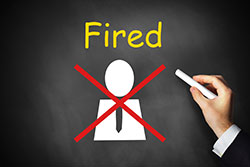|
Tuesday, January 5, 2016

It is impossible to predict every lawsuit that a small business might possibly face. There is nothing to prevent angry vendors, entitled customers, or disgruntled employees from filing a lawsuit, even if there is no legitimate basis for it. The more a business owner delegates responsibilities to employees, the greater the risk that an employee makes a mistake and exposes the business to a lawsuit. Even the most vigilant, hands on business owner is bound to make a mistake that can lead to a complaint filed against the business.
The most common lawsuits brought against businesses are wrongful termination suits brought by employees or candidates who have suffered a negative employment action. This can be anything from being fired to being demoted or even passed over for an advancement opportunity. If the employee or candidate believes that the action was taken for a reason related to race, gender, religion, identity, or another protected classification, that employee might file a lawsuit. For this reason, it is important to document any sort of negative or positive behaviors at work, so that if an employee does complain of discrimination, the courts can see the employee’s work history and the real reason why he or she may have been passed over for a promotion. Disparaging remarks made about any of these protected classes have no business in a work place as they can create a hostile work environment and lead to lawsuits as well.
Many employers choose to save money by denying their employees overtime pay. This can create many extra costs, as employees will sue for the money they are owed, and the legal fees can be significant. It is a good idea to have contracts establishing the boundaries of a relationship between an employer and an employee to minimize confusion.
It also makes sense to put agreements with vendors and customers in writing. The contracts should include a general description of the work to be performed, a list of any items to be delivered, a project schedule with deadlines, the fee, and the circumstances under which additional fees might be charged, warranties included with the work, how long the contract lasts, how it can be terminated, and how disputes will be resolved.
Personal injury lawsuits against businesses are also common, so it is important to make sure that a place of business is kept in safe condition. Floors should always be dry and warnings should be presented to customers of any dangerous conditions. Drivers should be selected carefully as any accident they cause can be made the responsibility of the business that employs them. Employees who are injured at work are usually precluded from suing their employer and are instead referred to worker’s compensation courts which have their own legal fees. Most states require employers to carry insurance in case of a workplace injury. If you own a small business and need our legal assistance, call us today for your complimentary in-office initial consultation, Franz Cobos, Esq.
Thursday, December 24, 2015

The overwhelming majority of employees are considered to be at-will employees. If an employee works without a contract stating otherwise, that person’s employment is considered at- will for its duration. This means that the person serves at-will and either party may terminate the employment at any time. Even though an explanation is not always given as to why an employee is being fired, there are still some reasons for termination that are unacceptable in the eyes of the law. It is important to be aware of these instances to avoid the appearance of improper behavior and the potential for economic repercussions as a result.
Termination is not the only action that may be actionable. Under specific circumstances, an employee is permitted to file a claim against an employer for any negative employment actions, including cutting back available hours, pay reductions, or demotions in title. Any negative employment action may give rise to a lawsuit if the employee can prove that the basis of the negative employment action is improper or discriminatory.
Federal law prohibits discrimination against employees on the basis of race, gender, national origin, disability, religion, genetic information, or age, if the employee is over the age of 40. Many states add additional protections including protection from discrimination against employees due to sexual orientation or gender identity.
Other restrictions against firing or other actions that negatively affect job status also exist. It is illegal to fire someone one, or otherwise negatively affect their employment, in retaliation for their filing of a legal claim, whether for discrimination, sexual harassment, or workers compensation. An employer also may not use a person’s ability to work as an incentive to force him or her to take a lie detector test. No individual can be legally fired for complaining about OSHA violations, for refusing to commit an illegal act, or for reporting an illegal act committed by a co-worker or employer (whistle blowing). If an employee exercises a legal right, like voting or taking family leave based on the Family Medical Leave Act, he or she cannot legally be fired for the lost time.
Terminating or otherwise negatively affecting an individual's employment because of any of the above-mentioned events is illegal. Employers should go out of their way not to fire employees contemporaneously with such events, even for other causes, since this may give the appearance of impropriety,and potentially provoke an expensive lawsuit. If you are a business owner facing such a claim or lawsuit, we can help. Call now for your complimentary initial consultation, Franz Cobos, Esq.
Monday, October 26, 2015

1. Deciding on a Business Form
There are various business forms to choose from. A sole proprietorship is the easiest to set up, manage, and maintain. There is minimal paperwork necessary to set up a sole proprietorship since there is no distinction between the business and the proprietor. Unfortunately, if a sole proprietorship faces a lawsuit, the owner’s personal assets are at stake.
This can be avoided by registering a Limited Liability Company (LLC) with the state. An LLC limits an owner’s liability to the investment in the company, but it requires filing separate taxes every year and can affect the business’s profit margin. Other common ways of organizing a business include corporations, partnerships, and 501c(3) nonprofit organizations. Partnerships, LLC’s, corporations or nonprofits all have advantages and disadvantages. It is wise to discuss this matter with a qualified business law attorney who can lead you in the right direction when it comes to business form.
2. Deciding on an S Corp or a C Corp
If you decide that a corporation is the right form, it is important to understand the various types of corporations. S- and C- corporate forms are available. There are several differences between a C Corp and an S Corp. The most significant is the way the two are treated for tax purposes. A C-Corp pays taxes on its profits and the principals pay taxes on the money they have received from the company. In an S-Corp, the business files a K-1 form and the profit from the business is included in the individual taxes of the principal. An S-Corp is permitted to shift some of its income from one year to the next. In addition, a C-Corp has more leeway in determining when its fiscal year starts and ends.
3. Securing an entity name and a tax ID number
Securing a tax ID number is a simple process, requiring only the filling out of forms either on the IRS website, by mail, by fax or by touchtone telephone. No fee is necessary for the application. A tax ID number may also referred to as an EIN (Employer Identification Number), is nine digits long.
4. Register with your state
In order to ensure compliance with rules governing workers' compensation, unemployment insurance, local taxes and access to other government resources, it is important to notify the state in which you operate what you are doing.
5. Obtain necessary licenses and permits
Depending on the type of business you run, different permits may be required to operate. For example, a restaurant not only requires approval by the board of health, but requires a liquor license in order to be legally permitted to serve alcohol.
We can help you decide what is necessary to start your business off on the right foot. Franz Cobos, Esq.
Monday, September 21, 2015

1. Buy the assets instead of the business
Purchasing a small business includes assuming any debt accrued by the business. The buyer is also purchasing any potential liability from accidents or misconduct of the seller that occurred prior to the sale. This can be avoided if the new owner purchases the assets instead of buying the entire business. Taking this action also resets the tax basis of those assets to the current purchase price instead of the price the seller paid for them.
It is important to make sure that the assets are being sold unencumbered, meaning that they were not financed since any debts accrued may follow the assets. The assets, such as machinery or furniture, should be inspected and tested to make sure they are in good condition and fully functional. Also, the buyer should consider paying in installments so that if assets turn out to be damaged and require repair or liabilities are discovered down the line, deductions can be made from future payments. Purchasing assets is usually the better option for a small business owner. It is always wise to consult with an attorney to determine your best options.
2. Examine the lease
Leasing space is one of the most expensive aspects of running a business. Before purchasing, the small business owner should review all potential expenses, paying particularly careful attention to the lease. The purchaser should confer with the landlord to confirm that:
No problems will arise in the lease if a transfer occurs;
No back rent is owed; and
The premises are in good condition.
If the buyer intends to renegotiate the lease, it should be done prior to the purchase.
3. Evaluate the landlord
If there are other tenants in the area, the potential buyer should question them in order to assess the landlord's trustworthiness. If other tenants have had problems with the landlord, it is likely that the new owner will have issues as well. If the prospective landlord does not have the reputation of being honest or reliable, it probably does not make sense to go through with the purchase.
4. Ensure a smooth transition
Many sellers do their best to hide the fact that the business is being sold from their employees. This can present serious difficulties for the new owner since, in order to continue operations after a purchase, it is crucial that key employees remain on staff to help ease the transition. A potential buyer should always speak with existing employees to confirm their competence and willingness to stay on. These key employees have ongoing experience in running the day-to-day operations of the business and are likely to be aware of problems with running the business that have not been revealed by the seller and are not immediately apparent to newcomers.
At times, the seller stays on to consult with the buyer for months after the sale to ensure a smooth transition. In any event, the buyer should always make sure that the seller signs a non-compete provision to prevent future conflicts. Now, is when you need an aggressive and knowledgeable attorney. Call us today for your consultation. Franz Cobos, Esq.
Friday, August 21, 2015

Lawyers are often mocked in pop culture as “sharks,” but a quick flip through the TV guide tells you the real sharks out there are in the business world. The ABC reality show “Shark Tank” has become a cultural phenomenon, inspiring tons of people to start their own businesses and invent new products.
If you are part of the wave of Shark Tank inspired entrepreneurs, here are some legal tips for you.
Don’t go into the Shark Tank, or into business, without a plan. On the show, the entrepreneurs that do the best are the ones that are the best prepared to answer all of the sharks’ questions. In the everyday business world the same is true. It’s just that it’s not sharks asking the questions - it’s investors, employees, and the other companies you are doing business with.
Be prepared to take risks, but preferably not legal ones. Starting a business is a gamble, but it can be downright dangerous if you don’t fully comprehend the legal risks you are taking on. Several entrepreneurs have had their dreams crushed by the sharks because their business is just too big of a legal risk to invest in. In order to be successful in business you need to know what risks you face so you can plan around them.
Be prepared to negotiate. The sharks rarely buy into a business on the first terms offered to them by the entrepreneurs. In and outside the tank, the successful business owners and inventors are the ones prepared to negotiate to get a deal that is good for both parties. This often means giving up more equity than originally planned or revaluing assets to reflect market realities.
Patents are shark bait. The old saying “you’ve got to spend money to make money” is absolutely true in the innovation world. The sharks’ eyes light up when an inventor mentions that they have a patent on the idea or product they are pitching. That’s because patents are hard assets that you can buy, sell, license or build a business around. If you have a great idea, spend the money to patent it.
Going head to head with the sharks is something only a few businesses do. But feeling like you have been thrown to the sharks is something all business owners and inventors can identify with. If you are looking for someone to help you navigate the legal issues your business is facing - from starting up, to scaling up, to selling out. We can help you. Call us for a consultation today. Franz Cobos, Esq.
Friday, July 17, 2015

Technology is a double-edged sword. It allows us to work remotely and to have greater flexibility as to where and when we work, but the freedom it affords can also be a burden. When you can work from anywhere, and at any time, it often feels like you should be doing so!
Studies suggest people are caving under the pressure - whether explicit or implicit - to work while technically off the clock. According to the Pew Research Center, approximately 44% of Internet users regularly perform some job tasks outside the workplace.
All the work that is being done outside of work hours is creating a compliance problem for many businesses. The federal Fair Labor Standards Act (FLSA) requires employers to compensate employees that are not exempt from the law for all time worked. These non-exempt employees must all be paid time and a half for all hours worked over 40 per week. This means that employees need to be paid (at overtime rates if applicable) for time spent checking and responding to emails, calls, texts, etc. during non-work hours.
In order to remain FLSA compliant in this technology-driven age, we advise our clients to take the following steps.
Develop a Timekeeping Policy that is Compliant with the FLSA
Explicitly tell your non-exempt employees, preferably in writing, whether or not they are allowed or required to work during non-work hours. Make it clear that “working” includes checking emails and taking phone calls.
Implement the Timekeeping Policy
A policy is not worth the paper it is printed on if it is not actually implemented. Make it easy for employees to report their off-the-clock work, and discipline employees who do not report their off-the-clock time.
Enforce the Timekeeping Policy
When off-the-clock time is reported, pay your employees for it. Be clear about how much, if any, off-the-clock time employees are expected to work, and do not be afraid to discipline employees who do not comply with expectations.
If you have any questions about paying employees for work done off-the-clock or any other business related issue, contact an experienced business law attorney today.
Monday, June 22, 2015
8099.jpg) Commercial Lease Disputes
Sometimes a business grows more rapidly than expected and its leased space is no longer large enough. Other times a business finds itself losing money and unable to pay rent. In those instances, it is the commercial tenant that desires to break its lease. There are times, however, when a commercial landlord seeks to break a lease and even threatens eviction for reasons that may lack merit.
A commercial lease is basically a contract that establishes a relationship between the parties and outlines the respective rights and obligations of each. These documents can be confusing and complex. Resolving a commercial lease dispute often involves business, contract and real estate laws.
Unlike residential leases, where the law heavily favors tenants, in the commercial world, the law tends to be more even-handed. The terms of the lease (even if all you have is an oral agreement) are most often going to be what governs the outcome of the dispute. This reflects the view that both parties involved in commercial lease agreements are sophisticated business entities that can protect their interests.
Since the terms of the lease are most likely going to govern if you file a lawsuit and take your dispute to court, it is essential that anyone evaluating your case examines your lease in depth. Even if an out-of-court settlement is negotiated, familiarity with your particular lease agreement is crucial for anyone advising you. Many commercial leases contain a dispute resolution clause that might require mediation or arbitration. These options can often lead to a resolution in less time and with less expense than traditional litigation.
Assessing damages and amassing the means to prove those damages is another important component to handling a commercial lease dispute. Typically, monetary damages are sought. There might be a clause in the lease regarding attorneys' fees. Again, it is vital that a competent and informed review of your particular lease is made to properly guide your case.
Call us today to discuss your commercial lease dispute and learn what legal options are available. Franz Cobos, Esq.
Monday, June 1, 2015

10 Things to Bring to Your First Meeting With Your Attorney
Hiring an attorney is not something most people do every day, so being a little bit unsure of how things are going to go is perfectly normal. To help ease some of the stress and make the process go more smoothly, take time to compile and bring the following list of items with you to your first meeting.
- A list of all your contact information. Your lawyer is going to need to know your full legal name and any other names you go by, your address, phone number(s), and email address.
- The names and contact information of other people that might get involved with the case - people on the other side, people on your side, witnesses, doctors, police, insurance agents, etc. If a case has already been filed against you, the name(s) and contact information of the lawyer(s) representing the other side will also be needed.
- A typed up or written down account of the circumstances surrounding the situation that is causing you to seek legal help. Try to make your summary of events as detailed as possible. If writing or typing isn’t one of your strengths, try creating an audio recording.
- A timeline of events. The best way to do this is to buy a calendar, write all the important events on it, and bring it to the meeting with you.
- Any materials (including documents, digital files and photos) you have that relate to your legal matter. If possible, put the documents in an order that makes sense when paired with the summary of events and timeline you put together above.
- A list of information (particularly documents) you wish you had or thought you had but can’t seem to find now.
- The truth. You don’t have to swear to tell the truth, the whole truth, and nothing but the truth unless you are taking the witness stand in the courtroom, but lying to your attorney will not help your case.
- Bring a good idea of what you hope to get out of the case. Think about what winning looks like to you. It is difficult for your attorney to figure out how best to help you if they don’t know what you want.
- An open mind paired with a good sense of what your gut is telling you. Your lawyer may suggest a solution that you would never have imagined, or let you know that you don’t have a case. Listen to what they tell you, but don’t be afraid to share your thoughts on their suggestions.
- A list of any questions you have. The meeting will be far more productive if you leave without nagging questions or lingering doubts.
We are here to help. Call us for a consultation. Franz Cobos, Esq.
Thursday, April 16, 2015
3907.jpg)
Most Legal Issues Can Be Resolved Before They Even Arise. Here’s How.
Most people are familiar with the idea of “preventative” legal action. The term refers to anticipating legal issues and conflicts and working to prevent them, rather than solving them or “winning” them once they occur. Companies can benefit from implementing preventative legal strategies as this approach is often less expensive than litigation, mediation, arbitration, and local, state and federal fines.
By working with an attorney early on in the creation of your new business, you can build a sound foundation for your company while likely saving money down the road. The following steps can serve as a great starting point for sound legal planning:
- Establish a relationship with an attorney who can assist you with the legal issues your new business will face early on in the start-up process. When an attorney is familiar with your firm from the onset, he or she can more effectively anticipate and address legal challenges and provide solutions.
- Determine what you want, negotiate it and memorialize it in proper legal documents. Businesses encounter disagreements with vendors, landlords, employees, partners and others. To minimize the number of conflicts, it’s important to establish written contracts for all important agreements, arrangements and accommodations.
A business law attorney can help you identify all key concerns regarding employee compensation and benefits, property usage and maintenance, relationships with suppliers and responsibility and profit sharing with partners. An attorney can ensure that, when a question, disagreement or conflict arises, your interests are written down, clearly stated and legally protected by a mutual agreement with the party in question.
- There are many exciting steps in starting a new business venture; selecting the type of legal entity the business will be is rarely one of them. Yet, it’s important to select a business structure early. Corporations offer numerous advantages but also require officers, boards, articles of incorporation and other formalities. Partnerships and sole proprietorships are simpler than most other business structures but open owners to potentially costly liability. Limited liability companies offer a middle ground for many, providing a liability shield and comparative simplicity. We can help you determine which business structure will work best for you by taking into account tax planning, location and other key considerations.
Even with preventative legal planning, a lawsuit may arise. If it does, it’s important to approach it from a business, not a personal standpoint. This strategy can help you make decisions that are best for your company’s future, keep your focus on the day-to-day needs of your business and avoid unnecessarily disclosing information. For legal advice and hands-on assistance during the formation and continued operation of your business, contact us for a consultation.
|

|
|
|